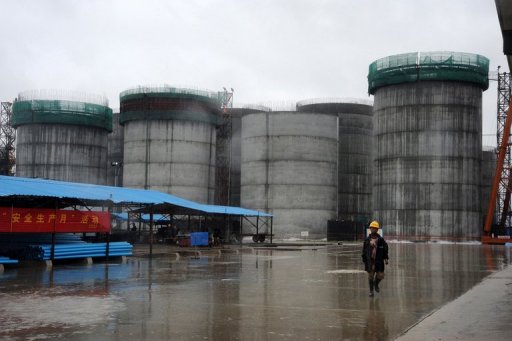BEIJING – Gas has started flowing to energy-hungry China through a pipeline from Myanmar, a Chinese state oil company said Monday, in a major project that highlights their economic links even as political ties come under pressure.
The 793-kilometre (492-mile) pipeline runs from Kyaukpyu on resource-rich Myanmar's west coast, close to the offshore Shwe gasfields, and across the country.
It enters southwest China at Ruili, near areas where heavy clashes between the rebel Kachin Independence Army and the Myanmar military were reported earlier this year.
The controversial project is the fruit of Beijing's long allegiance with the military junta that ruled Myanmar for decades, a bond that is weakening as the reforming government opens up to the West.
It went into operation on Sunday at a ceremony in Mandalay, key investor China National Petroleum Corporation (CNPC), said in a report posted on its website.
"When torches flamed in the sky... a storm of applause and cheers broke out," China's official Xinhua news agency reported.
Construction began in June 2010, according to CNPC, and a parallel oil pipeline is also part of the project.
According to Xinhua, the gas pipeline will be able to carry 12 billion cubic metres annually, while the crude oil pipeline has a capacity of 22 million tonnes per year.
Under military rule Myanmar – which also includes tin and precious gems among its natural assets – was a pariah state largely isolated from the rest of the world and subject to heavy international sanctions, but it maintained close economic links with China, which for years was its major foreign influence.
But now that Myanmar is opening up politically and economically, more countries are setting up operations and seeking deals that sanctions had previously prevented.
"Myanmar used to be sanctioned by the West and China was its only friend," the Global Times newspaper, which is affiliated with the ruling Communist Party, acknowledged in an editorial. "Nowadays, it has opened more to the West. This will reduce its passion in cooperating with China, but does not mean it will set itself against China."
In a warning that Beijing expects its economic interests to be protected, the newspaper cautioned Myanmar that it must ensure agreements regarding the project are fulfilled, no matter who eventually leads the country, where democracy activist Aung San Suu Kyi has entered parliament.
"China should be determined to supervise Myanmar in doing so," the paper said. "Myanmar should hold a serious attitude toward China, and Chinese will take (the Myanmar) people's attitude toward the pipeline as a test of their stance on China."
The pipeline opens up a new route for China's fuel imports, and could help Beijing's attempts to promote economic growth in the vast and less developed west.
The Global Times editorial said: "This is another breakthrough in China's strategy of energy diversification and has obvious significance in reducing China's dependence on the Strait of Malacca for the import of oil and natural gas."
But the Shwe Gas Movement, a campaign group, says the project has sparked protests over issues including demands for higher salaries for local workers, and concerns among farmers about its environmental impacts.
Xinhua, in a commentary Monday, blasted what it described as "Western criticism" of the pipelines, saying they were part of Beijng's effort to ensure energy security and would simultaneously benefit the people of Myanmar by providing jobs.
"Why do some Western critics make irresponsible remarks on the project? It stems from their shady mentality," Xinhua said.
Chinese nervousness about investments in Myanmar comes after Myanmar said last week it had revised a controversial copper mine agreement with a Chinese company, after dozens of Buddhist monks and villagers were injured in a botched police raid.
Myanmar Minister of Mines Myint Aung told parliament that new terms gave the government 51 percent of the revenue, replacing a previous deal that was a joint venture between the Chinese firm and a holding company owned by the Myanmar military.
In 2011, Myanmar President Thein Sein stopped construction on the China-backed $3.6 billion Myitsone Dam on the Irrawaddy river amid public opposition to the project, a move that led Beijing to call for its companies' rights and interests to be protected.
Myanmar plans to renegotiate billions of dollars of natural resource deals as it imposes tougher environmental standards and clamps down on corruption, the US-based Asia Society said in a report last month.




















































